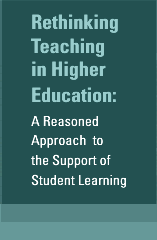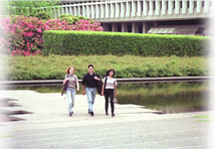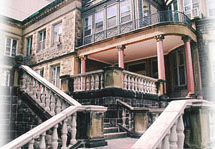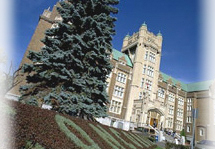 |






|
RESEARCH ACTIVITIES | Studying the Impact of Our Work The most common format for the Workshop takes place over a five-day period and involves thirty hours of group and individual work, plus readings and other preparations for the following day. Participant professors from different disciplines design or redesign a course of their choice and practice teaching aspects of it. By the end of the workshop, participants have produced a course outline including an assessment plan. They also create an action plan for the implementation of their new course design. The purpose of the year-long follow-up groups is to support faculty as they implement their action plans, explore teaching related questions and continue the sense of community developed during the Workshop. Many past participants of the workshop return to act as co-instructors for subsequent workshops and to participate in follow up groups. (See Saroyan & Amundsen, 2004 for a detailed description). We realized after our first offering of the Workshop that we needed to go beyond mrere satisfaction ratings to understand the transformation in thinking that many participants reported to us. Since then, we have assessed the usefulness and meaningfulness of the Workshop, and now the yearlong follow up groups in a number of ways, all of which will be reported in detail. Pre-Post Workshop Questionnaire: We have continued to develop pre-post workshop questionnaires with the purpose of probing more deeply changes in thinking about teaching and learning over the period of the workshop. One study coded relevant questionnaire items using Ramsden's (1992) three theories of teaching and found that, among other changes, all 41 participants changed (to various degrees) their focus from viewing teaching as transmitting knowledge to a more integrated and complex conception of teaching (Saroyan, Amundsen, & Li, 1997). Currently a more sophisticated instrument is being developed that will explore changes that occur pre-post workshop and post follow up group in terms of the following four tenets: disciplinary knowledge linked to teaching actions, learning-centered teaching, reasoned approach to teaching decisions, coherence and alignment of course design elements. (See the description of Amrit Mundy's thesis). Elements of the CDTW: In addition, we have assessed why certain elements of the workshop are described as particularly meaningful by participants, for example, the analysis of course content using a concept map. We have used semi-structured interviews, materials produced at the CDTW and video taped sequences to investigate these aspects. Our findings indicate that professors made changes in their thinking about their course and consequently the design of it in a number of ways including: 1) brought parts of the course together that they had previously taught separately; 2) adjusted the relative importance of course concepts; 3) linked assignments and class activities specifically to learning; 4) created ways to use the course concept map with students. (Amundsen, Weston, & McAlpine, in preparation). Case Studies: We have conducted a number of case studies, following professors as they implement the course design developed in the CDTW to better understand the facilitators and barriers to continued teaching development (Gryspeerdt, 1997; Amundsen, Saroyan, & Frankman, 1996; Saroyan & Amundsen, 1996). Classroom Research Studies: Some of the professors that participate in the CDTW have asked for support in conducting a formal investigation of changes as they implement them. We are currently conducting two classroom studies, one with a professor of Economics and another of Mathematics. Follow up Groups: We are currently investigating the effectiveness of the yearlong follow up groups. Groups meet every month and are being videotaped. Follow-up groups are being conducted at all three Universities during 2004-2006. We are currently working to determine what elements of the groups we will investigate in depth, but are particularly interested in what participants say about implement workshop concepts (knowledge) and how they report actually implementing them (skills). |